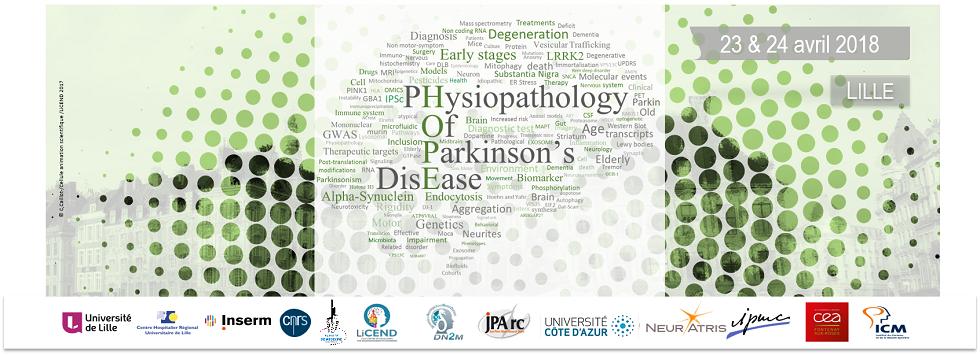Mutations in LRRK2, encoding Leucine-Rich Repeat Kinase 2 (LRRK2), cause autosomal dominant Parkinson's disease (PD) forms. The most frequent G2019S substitution leads to a gain of function associated with increased LRRK2 kinase activity. Recent studies suggest that LRRK2 modulates mitochondrial homeostasis. Mitochondrial dysfunction intervenes in the pathogenesis of autosomal recessive PD forms linked to PARK2 and PINK1, encoding the cytosolic E3 ubiquitin-protein ligase Parkin and the mitochondrial kinase PINK1. These proteins regulate jointly various mechanisms of mitochondrial quality control, including mitophagy.
Here, we explored the role of LRRK2 on PINK1/Parkin-dependent mitophagy. We studied the impact of LRRK2 overexpression on mitochondrial clearance triggered by exogenous Parkin in a COS7 cell model treated with the protonophore CCCP. By using immunofluorescent approaches, we observed a delay in the clearance of specific mitochondrial markers in cells overproducing LRRK2. This effect was enhanced by the G2019S substitution. In an attempt to dissect the underlying mechanisms, we explored protein-protein interactions involving Parkin and Drp1 on the outer mitochondrial membrane, using FRET imaging microscopy. We observed an alteration of protein-protein interactions involving Parkin and Drp1 on the mitochondrial membrane in conditions of LRRK2-WT or LRRK2-G2019S overexpression. In contrast, a kinase-dead LRRK2 variant had no effect. Moreover, the inhibition of LRRK2 kinase activity by LRRK2-in-1 restored these interactions, suggesting that the impact of LRRK2 is dependent on its kinase activity. In complementary studies, we investigated mitophagy in human primary fibroblasts, using the mtRosella reporter after its validation in this model. We observed that mitophagy was less efficient in fibroblasts from patients with the G2019S LRRK2 mutation and from patients with PARK2 mutations than in fibroblasts from control individuals. The inhibition of LRRK2 kinase activity enhanced mitophagy in fibroblasts from LRRK2 patients but not in fibroblasts from PARK2 patients.
Altogether, our studies suggest that PD forms due to LRRK2 and PARK2/PINK1 mutations share common pathogenic mechanisms converging on defective mitophagy.

 PDF version
PDF version
